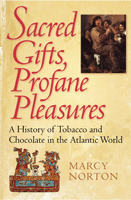
Sacred Gifts, Profane Pleasures. A History of Tobacco
and Chocolate in the Atlantic World. Ithaca: Cornell University Press,
2008. ISBN: 978-0-8014-4493-7 Before Columbus's fateful voyage in 1492, no European had ever seen,
much less tasted, tobacco or chocolate. Initially dismissed as dry
leaves and an odd Indian drink, these two commodities came to conquer
Europe on a scale unsurpassed by any other American resource or
product. A fascinating story of contact, exploration, and exchange in
the Atlantic world, Sacred Gifts, Profane Pleasures traces the ways in
which these two goods of the Americas both changed and were changed by
Europe.
Focusing on the Spanish Empire, Marcy Norton investigates how tobacco
and chocolate became material and symbolic links to the pre-Hispanic
past for colonized Indians and colonizing Europeans alike. Botanical
ambassadors of the American continent, they also profoundly affected
Europe. Tobacco, once condemned as proof of Indian diabolism, became
the constant companion of clergymen and the single largest source of
state revenue in Spain. Before coffee or tea became popular in Europe,
chocolate was the drink that energized the fatigued and uplifted the
depressed. However, no one could quite forget the pagan past of
tobacco and chocolate, despite their apparent Europeanization:
physicians relied on Mesoamerican medical systems for their
understanding of tobacco; theologians looked to Aztec precedent to
decide whether chocolate drinking violated Lenten fasts. The struggle
of scientists, theologians, and aficionados alike to reconcile notions
of European superiority with the fact of American influence shaped key
modern developments ranging from natural history to secularization.
Norton considers the material, social, and cultural interaction
between Europe and the Americas with historical depth and insight that
goes beyond the portrayal of Columbian exchange simply as a matter of
exploitation, infection, and conquest.
|
